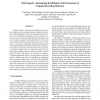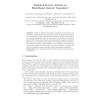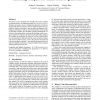5 search results - page 1 / 1 » Automatic Static Unpacking of Malware Binaries |
WCRE
2009
IEEE
13 years 11 months ago
2009
IEEE
—Current malware is often transmitted in packed or encrypted form to prevent examination by anti-virus software. To analyze new malware, researchers typically resort to dynamic c...
ACSAC
2006
IEEE
13 years 10 months ago
2006
IEEE
Modern malware often hide the malicious portion of their program code by making it appear as data at compiletime and transforming it back into executable code at runtime. This obf...
ICICS
2009
Springer
13 years 11 months ago
2009
Springer
With the advance of packing techniques, a few generic and automatic unpackers have been proposed. These unpackers are designed to automatically unpack packed binaries without speci...
SP
2010
IEEE
13 years 8 months ago
2010
IEEE
—To handle the growing flood of malware, security vendors and analysts rely on tools that automatically identify and analyze malicious code. Current systems for automated malwar...
PASTE
2010
ACM
13 years 9 months ago
2010
ACM
We present a novel technique that identifies the source compiler of program binaries, an important element of program provenance. Program provenance answers fundamental questions...



